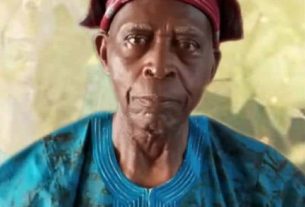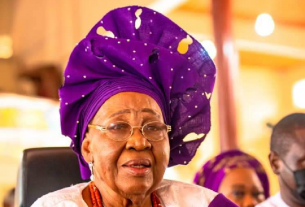It is human to mark anniversaries, whether personal milestones or national or key historical events. Institutions and businesses are no different and every major milestone is an opportunity to pause and reflect.
For The Guardian, today, the paper will be rolling out the drums to celebrate its 40th anniversary, which actually was marked on July 4, 2023.
Today’s celebration, which will be held at the Nigerian Institute of International Affairs (NIIA), Victoria Island, Lagos, is an opportunity to reflect on the Nigerian State.
President of African Development Bank Group, Dr Akinwumi Adesina, will deliver the anniversary lecture, which has the theme, For The World To Respect Africa…
The two-in-one programme will be followed by a public presentation of The Guardian Federalist paper titled, Federalism is the Answer… If Federalism is The Answer, What is The Question?
The keynote speaker is Director-General of the Nigerian Institute of International Affairs (NIIA), Prof. Eghosa Osaghae.
At the event, stakeholders will have the opportunity to discuss the country’s skewed federal structure and proffer solutions to some of the challenges that have faced the country since adoption of the federal system of government.
The book is a product of 61 editorials written in The Guardian between October 2020 and December 2021 on what form of government best fits the country.
In the editorial of January 14, 2021, the paper notes: “Whereas politics and shenanigans are global, in federalism abounds the steering wheel power for democrats to explore institutions to whip an intransigent personality into general will and create a system that works for all.”
Upon becoming a Republic in 1963, Nigeria technically switched from unitary to federal. “But it was a symbolic federalism that was not meant to be in substance. Nigeria has indeed practised quasi-federalism, which has concentrated all the powers at the centre and bred strong personalities over governing institutions,” says The Guardian in the editorial.
Looking at the American federalism, which Nigeria has struggled hard to ape, The Guardian notes: “Unlike in our case where the presidency had in 2019 curiously removed Honourable Justice Walter Onnoghen, then Chief Justice of Nigeria from office through an administrative tribunal headed by a non–judicial officer, the U.S. system constitutionally authorises justices to retain Supreme Court position for life, to deepen their independence and uphold democratic ideals. That is federalism and constitutionalism in action.”
The Guardian, over the years, has evolved innovative ways and systems to sustain the averments in its motto: Truthful, Trustworthy, Yesterday and Tomorrow as “Conscience” continues to be “Nurtured by Truth”.
From its maiden lecture titled, ‘The Debt Trap, Structural Adjustment and the Future of the Third World’, which was delivered by former Prime Minister of Jamaica, Michael Manley, to the fifth-anniversary celebration, which was a week-long package featuring other highlights including the public presentation of the book, ‘Perspectives on Nigerian Literature: 1700 to the present Vols I & II,’ which was a compilation of excerpts from The Guardian Literary Series, the lecture series have stood out in the country’s media landscape.
The success of the 1988 lecture spurred the subsequent editions held yearly until 1992, featuring very prominent personalities who were global figures with national and international issues at the centre of discourse.
In the 1989 edition of the lecture, Prof. Ben Nwabueze was the guest speaker. And the topic was, ‘Our march to constitutional democracy’. The following year (1990), the then Secretary General of the Organisation of African Union (OAU), Salim Ahmed Salim, spoke on ‘The European Economic and Monetary Union Scheduled for 1992 and its likely Impact on Africa’. The late Emeritus Professor J. F. Ade Ajayi delivered the 1992 lecture and he spoke on ‘The national question in historical perspective’. Earlier in 1991, the lecture featured the late renowned historian, Prof. Ali Mazrui, as guest speaker.
THE guest lecturer, Adesina, was born February 6, 1960. Adesina, who is often described as “Africa’s Optimist-in-Chief”, is widely lauded for his visionary leadership and passion for Africa’s transformation.
Formerly the Nigerian Agriculture Minister, Adesina graduated with a bachelor’s degree in Agricultural Economics (First Class Honours) from the University of Ife (now Obafemi Awolowo University) in 1981. He holds a Master’s degree (1985) and a PhD in Agricultural Economics (1988) from Purdue University, United States of America, where he won the Outstanding Ph.D. thesis award for that year.
Adesina won the prestigious Rockefeller Foundation Social Science Fellowship in 1988, which launched him into his international career.
A bold reformer, as Minister of Agriculture in Nigeria from 2011 to 2015, Adesina turned the agriculture sector of Nigeria around within four years. Under his tenure, Nigeria ended 40 years of corruption in the fertiliser sector by developing and implementing an innovative electronic wallet system, which directly provides farmers with subsidized farm inputs at scale using their mobile phones. Within the first four years of its launch, this electronic wallet system reached 15 million farmers, dramatically transforming their lives.
Prof. Osaghae, the keynoter, holds a PhD in Political Science from the University of Ibadan (1986), where he is a Professor of Political Science.
He was appointed Director-General of the Nigerian Institute of International Affairs (NIIA) by the President and Commander-in-Chief of the Federal Republic of Nigeria in March 2021, and was most recently Vice Chancellor of Igbinedion University, Okada, a position he held for a record 14 years (2004-2018).
Osaghae was the 2019 Claude Ake Chair at Uppsala University and Nordic Africa Institute, Sweden, and a Fellow of the Stellenbosch Institute of Advanced Studies in South Africa.
He was also the 2017 Van Zyl Slabbert Professor of Politics and Sociology at the University of Cape Town and the 2014 Emeka Anyaoku Chair of Commonwealth Studies at the University of London. His Anyaoku Chair Inaugural Lecture, ‘A State of Our Own: Second Independence, Federalism and the Decolonisation of the State in Africa’, in April 2014 became the first inaugural lecture by a Nigerian in the history of the University of London.
Before taking up an appointment at Okada, he was the Leader of the Ford Foundation-funded Programme on Ethnic and Federal Studies and Director of the Centre for Peace and Conflict Studies at the University of Ibadan. Between 1994 and 1998, he was Professor and Head of the Department of Political Studies at the University of Transkei, South Africa.
He has also been a Visiting Professor/Fellow/Distinguished Senior Scholar at the Carter Centre of Emory University USA (1989), University of Liberia (1989/90), Salzburg Seminar, Austria (1993), University of Cape Town South Africa (1994), the Nordic Africa Institute, Uppsala Sweden (1994), University of Ulster, Northern Ireland (1999, 2000), Northwestern University USA (2002, 2004), University of Cambridge UK (2003), a number of universities and research institutes in India (2005, 2009), Dartmouth College USA (2005) and Yale University USA (2009).
The Guardian





